Ditapis dengan
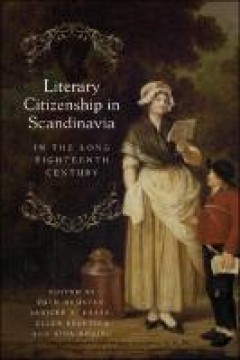
E-Book Literary Citizenship in Scandinavia in the Long Eighteenth Century
Sheds new light on European and regional book markets, the development of a public sphere and the impact of new media on intellectual, social, religious and political change. How do you become a citizen? Ever since printing was introduced, being a member of society increasingly involved reading and writing: for sociability and belonging, instruction and entertainment, profit and charity, spirit…
- Edisi
- -
- ISBN/ISSN
- 9781805430469
- Deskripsi Fisik
- 330 halaman
- Judul Seri
- -
- No. Panggil
- 948 HEM l
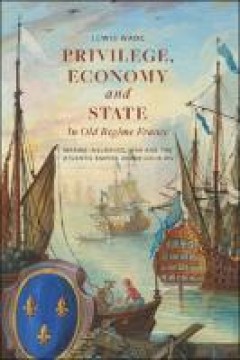
E-Book Privilege, Economy and State in Old Regime France: Marine Insurance, W…
This book closely analyses the rise and fall of Louis XIV's marine insurance institutions in Paris, which were central to the French monarchy's efforts to stimulate commerce, colonial enterprise and economic growth. These institutions were the projects of two leading ministers, Jean-Baptiste Colbert and his son, the Marquis de Seignelay. While both men recognised that marine insurance was cruci…
- Edisi
- -
- ISBN/ISSN
- 9781800108813
- Deskripsi Fisik
- 378 halaman
- Judul Seri
- -
- No. Panggil
- 944 WAD p
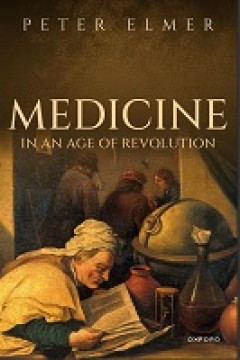
E-Book Medicine in an Age of Revolution
This work is the first major attempt since the 1970s to challenge the idea that the essential engine of medical (and scientific) change in seventeenth-century Britain emanated from puritanism. It seeks to reaffirm the crucial role of the period of the civil wars and their aftermath in providing the most congenial context for a re-evaluation of traditional attitudes to medicine. In the process, …
- Edisi
- -
- ISBN/ISSN
- 9780198853985
- Deskripsi Fisik
- 471 halaman
- Judul Seri
- -
- No. Panggil
- 610.1 ELM m
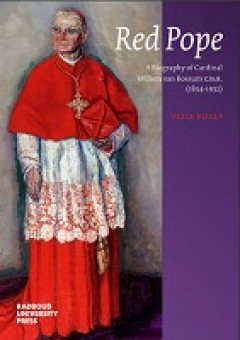
E-Book Red Pope: A Biography of Cardinal Willem van Rossum C.Ss.R. (1854–1932)
- Edisi
- -
- ISBN/ISSN
- 9789493296206
- Deskripsi Fisik
- 669 halaman
- Judul Seri
- -
- No. Panggil
- 922.1 POE r
- Edisi
- -
- ISBN/ISSN
- 9789493296206
- Deskripsi Fisik
- 669 halaman
- Judul Seri
- -
- No. Panggil
- 922.1 POE r
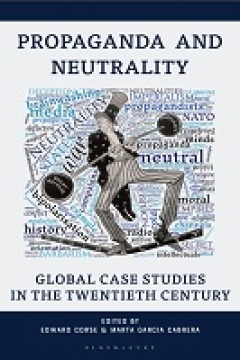
E-Book Propaganda and Neutrality: Global Case Studies in the Twentieth Century
This is the first broad-ranging, comprehensive and comparative study of the concepts of propaganda and neutrality. Bringing together world-leading and early career historians, this open access book explores case studies from the time of the First World War to the end of the Cold War in countries such as Belgium, Greece, Spain, Portugal, Ireland, Switzerland, Vichy France, USA, Argentina, Turkey…
- Edisi
- -
- ISBN/ISSN
- 9781350325531
- Deskripsi Fisik
- 329 halaman
- Judul Seri
- -
- No. Panggil
- 355.02 COR p
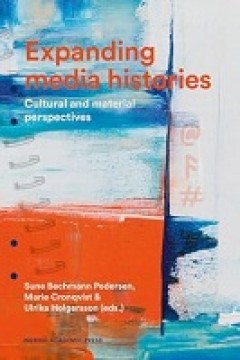
E-Book Expanding Media Histories: Cultural and Material Perspectives
Contemporary media history is a rapidly growing field that extends far beyond traditional studies of technology or institutions such as radio, film, and television. This volume expands the scope further still to analyse ephemeral, mundane phenomena long overlooked by media historiography. In eight original essays, the volume demonstrates the strengths of a broad concept of the media. The first …
- Edisi
- -
- ISBN/ISSN
- 9789189361676
- Deskripsi Fisik
- 256 halaman
- Judul Seri
- -
- No. Panggil
- 302.2 PED e
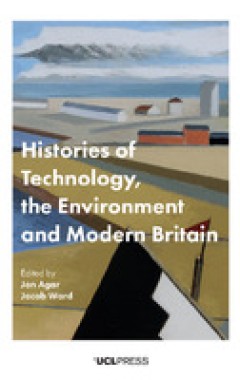
E-Book Histories of technology, the Environment and Modern Britain
Histories of Technology, the Environment and Modern Britain brings together historians with a wide range of interests to take a uniquely wide-lens view of how technology and the environment have been intimately and irreversibly entangled in Britain over the last 300 years. It combines, for the first time, two perspectives with much to say about Britain since the industrial revolution: the histo…
- Edisi
- -
- ISBN/ISSN
- 9781911576570
- Deskripsi Fisik
- 354 halaman
- Judul Seri
- -
- No. Panggil
- 609 AGA h
E-book The Saqqara Necropolis through the New Kingdom : Biography of an Ancie…
The city’s eminent position in the New Kingdom affected the nature of itsdesert-edge necropolis. The latter’s prominence is underlined by the fact thatsome of the kingdom’s most influential priestly, administrative, military, andcourtofficialschosetoconstructtheirtombs11inthisculturallandscapewhich,atthetime,wasalreadyancient.Italsousedtobeaverylivelyplace,onewhereancient people worked, l…
- Edisi
- -
- ISBN/ISSN
- 9789004467149
- Deskripsi Fisik
- 560 hlm
- Judul Seri
- -
- No. Panggil
- 930 STA t
E-book A Bowl for a Coin : A Commodity History of Japanese Tea
n September 2010, I was preparing to order a meal at a restaurant called The Gold of Africa in downtown Cape Town, South Africa. The waitress was dressed in appropriately African garb, and the menu listed specialties from Morocco, Kenya, and Egypt as well as South Africa. As I glanced at the drinks list, however, a most unexpected item caught my eye—Japanese green tea. About six months later,…
- Edisi
- -
- ISBN/ISSN
- 9780824882617
- Deskripsi Fisik
- 249 hlm
- Judul Seri
- -
- No. Panggil
- 950 FAR a
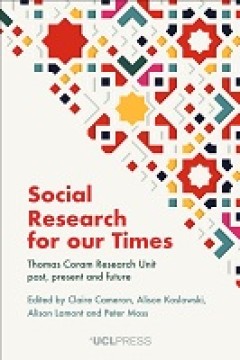
E-Book Social Research for our Times: Thomas Coram Research Unit past, presen…
For 50 years, researchers at UCL’s Thomas Coram Research Unit have been undertaking ground-breaking policy-relevant social research. Their main focus has been social issues affecting children, young people and families, and the services provided for them. Social Research for our Times brings together different generations of researchers from the Unit to share some of the most important result…
- Edisi
- -
- ISBN/ISSN
- 9781800084056
- Deskripsi Fisik
- 418 halaman
- Judul Seri
- -
- No. Panggil
- 907 CAM s
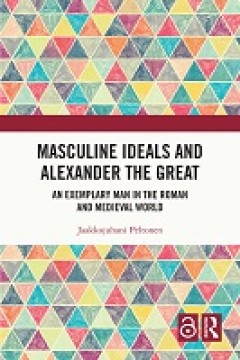
E-Book Masculine Ideals and Alexander the Great
From premodern societies onward, humans have constructed and produced images of ideal masculinity to define the roles available for boys to grow into, and images for adult men to imitate. The figure of Alexander the Great has fascinated people both within and outside academia. As a historical character, military commander, cultural figure and representative of the male gender, Alexander’s pop…
- Edisi
- -
- ISBN/ISSN
- 9781032523781
- Deskripsi Fisik
- 285 halaman
- Judul Seri
- -
- No. Panggil
- 930 JAA m
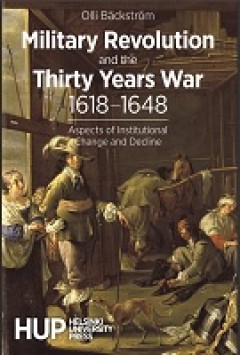
E-Book Military Revolution and the Thirty Years War 1618–1648: Aspects of I…
Military Revolution and the Thirty Years War 1618–1648 investigates change and decline in military institutions during a period of protracted and destructive European warfare. Conceptual background is provided by the Military Revolution thesis, which argues that changes in military technology and tactics drove revolutionary transformation in the way states organised and waged war in the early…
- Edisi
- -
- ISBN/ISSN
- 9789523690912
- Deskripsi Fisik
- 313
- Judul Seri
- -
- No. Panggil
- 303.66 BAC m
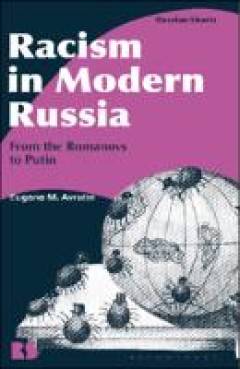
E-Book Racism in Modern Russia: From the Romanovs to Putin
In October 2013, one of the largest anti-migrant riots took place in Moscow. Clashes and arrests continued late into the night. Some in the crowd, which grew to several thousand people, could be heard chanting “Russia for the Russians” with their animus directed towards dark-skinned labor migrants from the southern border. The slogan “Russia for the Russians” is not a recent invention. …
- Edisi
- -
- ISBN/ISSN
- 9781350097315
- Deskripsi Fisik
- 160 halaman
- Judul Seri
- -
- No. Panggil
- 320.56 EUG r
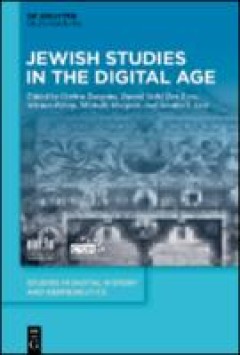
E-Book Jewish Studies in the Digital Age
The digitisation boom of the last two decades, and the rapid advancement of digital tools to analyse data in myriad ways, have opened up new avenues for humanities research. This volume discusses how the so-called digital turn has affected the field of Jewish Studies, explores the current state of the art and probes how digital developments can be harnessed to address the specific questions, ch…
- Edisi
- -
- ISBN/ISSN
- 9783110744828
- Deskripsi Fisik
- 384 halaman
- Judul Seri
- -
- No. Panggil
- 909.83 MAR j
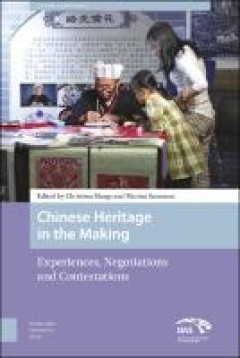
E-Book Chinese Heritage in the Making
The Chinese state uses cultural heritage as a source of power by linking it to political and economic goals, but heritage discourse has at the same time encouraged new actors to appropriate the discourse to protect their own traditions. This book focuses on that contested nature of heritage, especially through the lens of individuals, local communities, religious groups, and heritage experts. I…
- Edisi
- -
- ISBN/ISSN
- 9789048534067
- Deskripsi Fisik
- 299 halaman
- Judul Seri
- Experiences, Negotiations and Contestations
- No. Panggil
- 895.1 MAA c
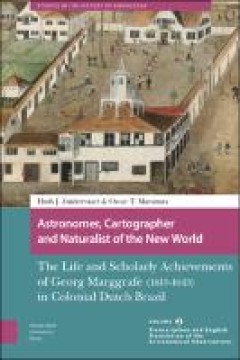
E-Book Astronomer, Cartographer and Naturalist of the New World
Georg Marggrafe, Colonial Dutch Brazil, Early Modern Science, Astronomy, 17th century
- Edisi
- -
- ISBN/ISSN
- 9789463722285
- Deskripsi Fisik
- 194 halaman
- Judul Seri
- The Life and Scholarly Achievements of Georg Marggrafe (1610-1643) in Colonial Dutch Brazil. Volume 2
- No. Panggil
- 980 ZUI a
E-book (Trans)missions : Monasteries as Sites of Cultural Transfers
From the Early Middle Ages onwards, both university and monastic theologians were occupied and concerned with the spiritual struggle against sin. The idea was based on the notion that in this world, people are surrounded by the power of the Devil and are left at the mercy of the Devil’s temptations. The enclosed monastery on the other hand represented a…
- Edisi
- -
- ISBN/ISSN
- 9781803273259
- Deskripsi Fisik
- 189 hlm
- Judul Seri
- -
- No. Panggil
- 274 BRE t
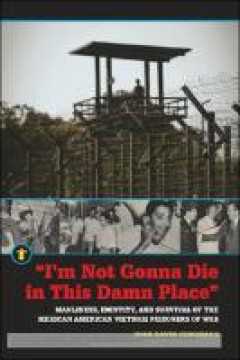
E-Book I'm Not Gonna Die in This Damn Place
By the time of the Vietnam War era, the “Mexican American Generation” had made tremendous progress both socially and politically. However, the number of Mexican Americans in comparison to the number of white prisoners of war (POWs) illustrated the significant discrimination and inequality the Chicano population faced in both military and civilian landscapes. Chicanos were disproportionately…
- Edisi
- -
- ISBN/ISSN
- 9781628953213
- Deskripsi Fisik
- 217 halaman
- Judul Seri
- -
- No. Panggil
- 940.54
E-book The Currency of Empire : Money and Power in Seventeenth-Century Englis…
his book examines the pivotal role that silver and gold money played in the formation and working out of England’s Amer-ican colonial proj ect in the seventeenth century. The book argues, first, that money was the primum mobile, or prime mover, of En glish imperial action and overseas activity, including the impulse for colonization, the regulation of colonial trade, and the introduction…
- Edisi
- -
- ISBN/ISSN
- 9781501755781
- Deskripsi Fisik
- 396 hlm
- Judul Seri
- -
- No. Panggil
- 970.03 BAR t
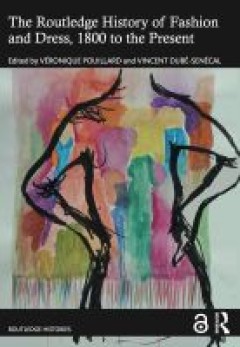
E-book The Routledge History of Fashion and Dress, 1800 to the Present
The time span covered by The Routledge History of Fashion and Dress starts in the nineteenth century, with the aftermath of the consumers’ revolution, and reaches all the way to the present. The fashion and garment industries have been international from the beginning and, as such, this volume looks at the history of fashion and dress through the lenses of both international and global histor…
- Edisi
- -
- ISBN/ISSN
- 9781000963427
- Deskripsi Fisik
- 576
- Judul Seri
- -
- No. Panggil
- 001.3
E-book The Return of the Buddha : Ancient Symbols for a New Nation
The popular English daily TheHindu carried a news item in its Friday Review on September 10, 2011 under the title ‘Kapilavastu Relics to be displayed in Sri Lanka’. The article referred to the unearthing of the relics at Piprahwa in the present Indian state of Bihar by Major General (retired) Alexander Cunningham (1814–93), the first head of the Archaeological Survey …
- Edisi
- -
- ISBN/ISSN
- 9780415711159
- Deskripsi Fisik
- 313 hlm
- Judul Seri
- -
- No. Panggil
- 930 RAY t
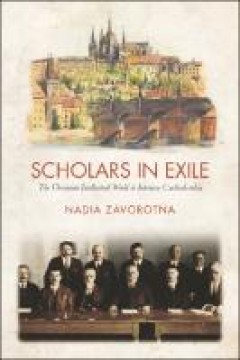
E-book Scholars in Exile
Throughout the 1920s and 30s Prague was the intellectual center of Ukrainian émigrés in Europe, not least because of significant financial support from the Czechoslovak government and its first president, Tomáš Garrigue Masaryk, for émigré students and intellectuals. On the basis of extensive archival research in Ottawa, Prague, and Kyiv, Zavorotna outlines the continuation of Ukrainian s…
- Edisi
- -
- ISBN/ISSN
- 9781487531577
- Deskripsi Fisik
- -
- Judul Seri
- -
- No. Panggil
- 940
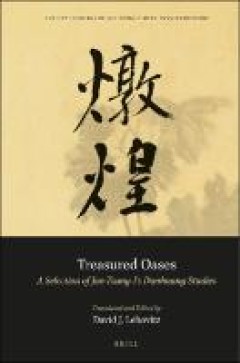
E-book Treasured Oases: A Selection of Jao Tsung-i’s Dunhuang Studies
Dunhuang: China’s traditional northwest frontier and overland conduit of exchange with the Old World. Jao Tsung-i: China’s last great traditional man of letters, polymath, and pioneer of comparative humanistic inquiry during Hong Kong’s global heyday. Jao and Dunhuang had a special relationship that this book makes accessible in English for the first time. Inside, Jao proposes an entirely…
- Edisi
- -
- ISBN/ISSN
- 9789004522558
- Deskripsi Fisik
- -
- Judul Seri
- -
- No. Panggil
- 910 02
E-book Ancient Olive Presses and Oil Production In Cyrenaica (North-East Libya)
Previous works on ancient olive oil and wine produc-tion in the ancient Mediterranean (Frankel 1999; Brun 2003b, 2004) and North Africa (Mattingly 1985; 1988a-d; 1993; 1994; 1995; 2009; Mattingly and Hitchner 1993) have broadened our knowledge on specifications, tech-niques and scale of production of Roman presses. These works discuss how this significantly contributed to …
- Edisi
- -
- ISBN/ISSN
- 9781915808011
- Deskripsi Fisik
- 178 hlm
- Judul Seri
- -
- No. Panggil
- 939.7 BUZ a
E-book Disturbing Times : Medieval Pasts, Reimagined Futures
These are disturbing times. Scholars in medieval and premod-ern studies are tired of explaining why, yet this labor continues to be performed by those who often have the least personal and professional security.1 A case in point here is Mary Rambaran-Olm, who consistently advocated, and with considerable risk for her own scholarly career and personal well-being, for the re-tire…
- Edisi
- -
- ISBN/ISSN
- 9781950192762
- Deskripsi Fisik
- 385 hlm
- Judul Seri
- -
- No. Panggil
- 935 KAR d
E-book Cultures in Conflict : Religion, History and Gender in Northern Europe…
For the debates about the ultramontanization of Catholicism in the course of the nineteenth century the contrast of an early example of pilgrimages and a later case during the heyday of ultramontanism can be revealing. Though sim-ilar in social and gender aspects there are differences on the level of organiza-tion, inherent ultramontanism and transnational traits. The phenom…
- Edisi
- -
- ISBN/ISSN
- 9783631847312
- Deskripsi Fisik
- 222 hlm
- Judul Seri
- -
- No. Panggil
- 274 BLA c
E-book The Nile : Natural and Cultural Landscape in Egypt
Although they contain a wealth of geographical information, land registers have not been fully exploited with the aim of reconstructing the Nile Valley landscape. However, compared to other written or pictorial sources, they have several advantages. 1) The geographical information they contain is based on onsite observation and therefore directly reflects the r…
- Edisi
- -
- ISBN/ISSN
- 9783839436158
- Deskripsi Fisik
- 371 hlm
- Judul Seri
- -
- No. Panggil
- 932 ANT t
E-book Dangerous Gifts : Imperialism, Security, and Civil Wars in the Levant,…
Two months after his arrival in Ottoman Syria in September 1860, the Prussianbureaucrat Johann Ludwig Guido von Rehfues (1818–97) and his colleagues setoff on a hauntingly memorable journey to Damascus.² Leaving Beirut early in themorning, they rodefirst up Mount Lebanon. From all the heights to which theirpath took them, they could see the smoke-stained rubble of onceflourishingvillages in …
- Edisi
- -
- ISBN/ISSN
- 9780198852964
- Deskripsi Fisik
- 418 hlm
- Judul Seri
- -
- No. Panggil
- 909.81 OZA
E-book When Egypt Ruled the East
On May 19, 1798 a French fleet under the command of the young general Napoleon Bonaparte sailed from Toulon in order to challenge the power of England in Egypt. He hoped by the conquet of the Nile to construct a French stronghold in the East from which to threaten British power and wealth in India. While the Nile Valley soon fell into French hands, confused political circumstances a home forced…
- Edisi
- -
- ISBN/ISSN
- 0226771989
- Deskripsi Fisik
- 304 hlm
- Judul Seri
- -
- No. Panggil
- 932 STE w
E-book How Computers Entered the Classroom, 1960–2000 Historical Perspectives
In the history of education, the question of how computers were introduced into European classrooms has so far been largely neglected. This edited volume strives to address this gap. The contributions shed light on the computerization of general education from a historical perspective, by looking closely at the different actors, political rationales and ideologies, as well as financial, politic…
- Edisi
- -
- ISBN/ISSN
- 9783110780147
- Deskripsi Fisik
- 247 hlm
- Judul Seri
- -
- No. Panggil
- 609 CAR h
E-book AP History : Modern
The structure of the unit guides respects new AP teachers’ time by providing one possible sequence they can adopt or modify rather than having to build from scratch. An additional benefit is that these units enable the AP Program to provide interested teachers with formative assessments—the Personal Progress Checks—that they can assign their students at the end of each unit to gauge progr…
- Edisi
- -
- ISBN/ISSN
- -
- Deskripsi Fisik
- -
- Judul Seri
- -
- No. Panggil
- 900 AHL a
E-book Introduction to The Study Of History
The historian works with documents. Documents are the traces which have been left by the thoughts and actions of men of former times. Of these thoughts and actions, however, very few leave any visible traces, and these traces, when there are any, are seldom durable; an accident is enough to efface them. Now every thought and every action that has left no visible traces, or none but what have si…
- Edisi
- -
- ISBN/ISSN
- -
- Deskripsi Fisik
- 192 hlm
- Judul Seri
- -
- No. Panggil
- 900 SEI i
E-book A Brief History Hawaiian People
Although it is true that history has more do with men and nations with the countries in which they act their parts, still it is within her province to show the position, climate, and physical features of a country have influenced the character and fortunes of the people who inhabit it.
- Edisi
- -
- ISBN/ISSN
- -
- Deskripsi Fisik
- 367 hlm
- Judul Seri
- -
- No. Panggil
- 996.9 ALE a
E-book Everyday Cosmopolitanisms : Living the Silk Road in Medieval Armenia
Sitting in the shadow of the north wall of the ruined caravan house (karavanatun) at Arai-Bazarǰuł on a clear day in summer, one can see four mountain peaks. To the west above Aragats, the tallest mountain in the Republic of Armenia, clouds catch and gather, threatening to descend and change the day from sun to hail in minutes. To the northeast, the stooping shoulder of Tełenis hefts a load …
- Edisi
- -
- ISBN/ISSN
- 9780520380936
- Deskripsi Fisik
- 206 hlm
- Judul Seri
- -
- No. Panggil
- 947.1 FRA e
E-book In the Lands of the Romanovs : An Annotated Bibliography of First-han…
When in 1613, following the Time of Troubles, the first Romanov came to the throne of Muscovy, sixty years had elapsed since, in the words of Richard Hakluyt, “the strange and wonderful Discoverie of Russia” by the English. It was Hakluyt who gathered together in his Principal navigations, voiages, [traffiques,] and discoueries of the English nation (first …
- Edisi
- -
- ISBN/ISSN
- 9781783740598
- Deskripsi Fisik
- 440 hlm
- Judul Seri
- -
- No. Panggil
- 947 CRO i
E-book Arcticness : Power and Voice from the North
People and communities, lives and livelihoods. These define the Arctic, just as with all other populated areas on the planet. Is there, then, any-thing special, specific, exceptional or unique about the Arctic? To the peoples in the Arctic, the answer is ‘of course’.Because it is home.As Arctic literature is fond of stating, there is no single Arctic. Definitions abo…
- Edisi
- -
- ISBN/ISSN
- 9781787350137
- Deskripsi Fisik
- 206 hlm
- Judul Seri
- -
- No. Panggil
- 998 BRE a
E-book Finding Jerusalem: Archaeology between Science and Ideology
Finding Jerusalem is not about bringing back to life ancient stones and walls hidden underground. It is not an adventurer’s quest for long-lost treasures and monuments of a city venerated by the three Abrahamic traditions. And least of all, it is not an attempt to uncover the biblical truth. Finding Jerusalem: Archaeol-ogy between Science and Ideology is …
- Edisi
- -
- ISBN/ISSN
- 9780520968073
- Deskripsi Fisik
- 274 hlm
- Judul Seri
- -
- No. Panggil
- 933 GAL f
E-book Ancient Knowledge Networks : A Social Geography of Cuneiform Scholarsh…
This is a book about how knowledge travels, in minds and bodies, writ-ings and performances. It explores the forms knowledge takes, the mean-ings it accrues and how they are shaped by the peoples and places that use it. This is also a book about the relationships between political power, family ties and literate scholarship in the ancient Middle East of the first millennium bc (see Tables 3a…
- Edisi
- -
- ISBN/ISSN
- 9781787355941
- Deskripsi Fisik
- 340 hlm
- Judul Seri
- -
- No. Panggil
- 935 ROB a
E-book The Hegemony of Heritage
What do we see when we look at a monument, and how do we come to see what we do? Far from the innocent ravages of time, the calculated aesthetics of the Indian temple today result from the confluence of religious performance, the politics of identity formation, the tension between neoliberal and socialist preservation mod-els, and the display, erasure, and fragmentation of the visual and materi…
- Edisi
- -
- ISBN/ISSN
- 9780520296336
- Deskripsi Fisik
- 340 hlm
- Judul Seri
- -
- No. Panggil
- 720.1 STE t
E-book The Scientific Revolution Revisited
This book is about interpreting the Scientific Revolution as a distinctive movement directed towards the exploration of the world of nature and coming into its own in Europe by the end of the seventeenth century. The famed English historian Lord Acton (1834-1902) is said to have advised that problems were more important than periods. If he held this o…
- Edisi
- -
- ISBN/ISSN
- 9781783741243
- Deskripsi Fisik
- 158 hlm
- Judul Seri
- -
- No. Panggil
- 940 TEI t
E-book Time and the Ancestors : Aztec and Mixtec Ritual Art
The title of our book pays homage to a classic anthropological monograph: Time and the Other by Johannes Fabian (1983). That critical work – unfortunately lit-tle used in studies of the ancient or indigenous Americas – examined the way in which the dominant party in an intercultural encounter tends to situate (to construct and to interpret) ‘the Other’, i.e. colonised or otherwise margi…
- Edisi
- -
- ISBN/ISSN
- 9789004340527
- Deskripsi Fisik
- 646 hlm
- Judul Seri
- -
- No. Panggil
- 972 JAN t
E-book Population, providence and empire : The churches and emigration from n…
etween seven and eight million men and women left Ireland over the course of the nineteenth century.1 For a country whose popula-tion has never been more than eight and a half million, that is a mind-boggling statistic, and one that might easily obscure individual emigrant lives. Historians have therefore tended to tackle Irish emigration in two di…
- Edisi
- -
- ISBN/ISSN
- 9780719090196
- Deskripsi Fisik
- 288 hlm
- Judul Seri
- -
- No. Panggil
- 941.5 ROD p
E-book Anton Pannekoek: Ways of Viewing Science and Society
Astronomer and Marxist Anton Pannekoek was a remarkable f igure. As an astronomer, he pioneered quantitative astrophysics and founded the renowned Astronomical Institute in Amsterdam that now carries his name. Before World War I, however, he was employed as a Marxist theorist by the Social Democratic Party of Germany, making him one of the leading intel-lectuals of international socialism. Beca…
- Edisi
- -
- ISBN/ISSN
- 9789048535002
- Deskripsi Fisik
- 323 hlm
- Judul Seri
- -
- No. Panggil
- 909 WIL a
E-book Sailors and Traders : A Maritime History of the Pacific Peoples
Centuries before the Pacific was revealed to Europeans, flotillas of ves-sels carried thousands of men, women, and children, together with plants and animals, to virtually every island in a vast ocean that covers about one-third of the surface of the globe. They settled in homelands with con-siderable diversity, ranging from the high islands of Papua New Guinea to small volcanic pe…
- Edisi
- -
- ISBN/ISSN
- 9780824887650
- Deskripsi Fisik
- 281 hlm
- Judul Seri
- -
- No. Panggil
- 990 COU s
E-book The Classical Parthenon : Recovering the Strangeness of the Ancient World
This book poses a question: since, in encounters between the present and the past, the present always wins, how might we in the present recover the strangeness of a society that flourished two-and-a-half millennia ago? Can we find ways of throwing off our mind-forged manacles, and instead make an attempt, without preconceptions or agendas, to…
- Edisi
- -
- ISBN/ISSN
- 9781800643468
- Deskripsi Fisik
- 346 hlm
- Judul Seri
- -
- No. Panggil
- 949.5 CLA t

E-book 3D printing technologies
The family of technologies collectively known as additive manufacturing (AM) technologies, and often called 3D-printing technologies, is rapidly revolutionizing industrial production. AM’s potential to produce intricate and customized parts starting from a digital 3D model makes it one of the main pillars for the forthcoming Industry 4.0. Thanks to its advantages over traditional manufacturin…
- Edisi
- -
- ISBN/ISSN
- 9783036531700
- Deskripsi Fisik
- ix, 98hlm; ill
- Judul Seri
- -
- No. Panggil
- 620.0042 BER p
E-book The Web as History : Using Web Archives to Understand the Past and the…
The web has been with us for more than a quarter of a century. It has become a daily and ubiquitous source of information in many peoples’ lives around the globe. But what does it tell us about historical and social change? For a researcher in the twenty-second century, it will seem unimaginable that someone studying the twenty-first c…
- Edisi
- -
- ISBN/ISSN
- 9781911307563
- Deskripsi Fisik
- 298 hlm
- Judul Seri
- -
- No. Panggil
- 025.042 ACK t
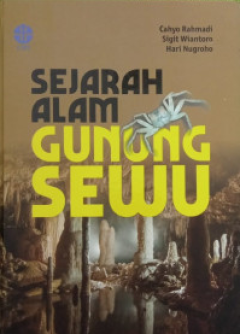
E-book Sejarah alam Gunung Sewu
Buku ini mengulas sejarah alam Gunungsewu berdasarkan hasil penelitian dari Pusat Penelitian Biologi (P2B-LIPI) yang telah 12 tahun melakukan kegiatan inventarisasi keanekaragaman hayati karst dan gua di Gunungsewu. Selain membahas aspek geologi, geomorfologi, hidrologi, dan speleologi, buku ini juga mengulas aspek hayati, baik yang ada di atas maupun di bawah permukaan. Kemudian tinjauan te…
- Edisi
- -
- ISBN/ISSN
- 9786024960018
- Deskripsi Fisik
- xvi, 141 hlm. ; ill
- Judul Seri
- -
- No. Panggil
- 551.447 RAH s
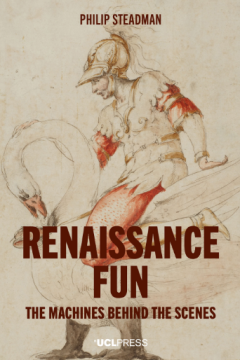
E-book Renaissance Fun
Renaissance Fun is about the technology of Renaissance entertainments in stage machinery and theatrical special effects; in gardens and fountains; and in the automata and self-playing musical instruments that were installed in garden grottoes. How did the machines behind these shows work? How exactly were chariots filled with singers let down onto the stage? How were flaming dragons made to fly…
- Edisi
- -
- ISBN/ISSN
- 9781787359154
- Deskripsi Fisik
- -
- Judul Seri
- -
- No. Panggil
- 792.02509031 STE r
E-book The Legacy of Christopher Columbus in the Americas : New Nations and a…
Wy is the District of Columbia, the capital of the United States, named after Christopher Columbus, a Genoese explorer commissioned by Spain who never set foot on the future US mainland? Why did Spanish Americans in 1819 name the newly independent republic “Colombia” after Columbus, the first representative of the Spanish Empire from which politi-c…
- Edisi
- -
- ISBN/ISSN
- 9780826519559
- Deskripsi Fisik
- 216 hlm
- Judul Seri
- -
- No. Panggil
- 970.01 BAR t
 Karya Umum
Karya Umum  Filsafat
Filsafat  Agama
Agama  Ilmu-ilmu Sosial
Ilmu-ilmu Sosial  Bahasa
Bahasa  Ilmu-ilmu Murni
Ilmu-ilmu Murni  Ilmu-ilmu Terapan
Ilmu-ilmu Terapan  Kesenian, Hiburan, dan Olahraga
Kesenian, Hiburan, dan Olahraga  Kesusastraan
Kesusastraan  Geografi dan Sejarah
Geografi dan Sejarah